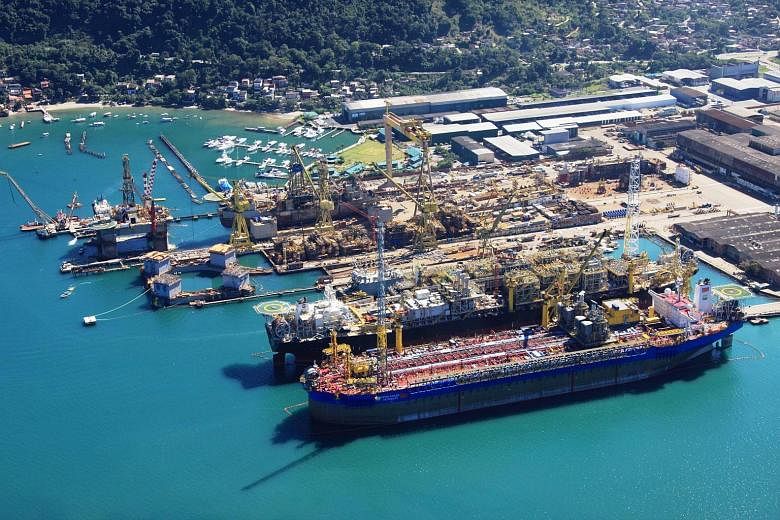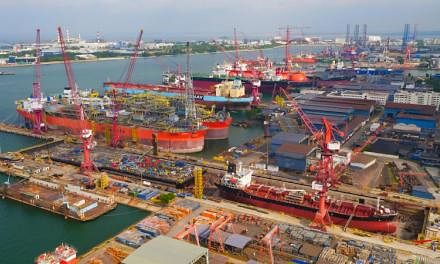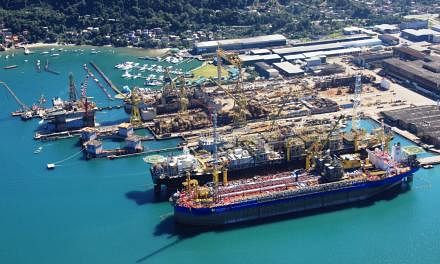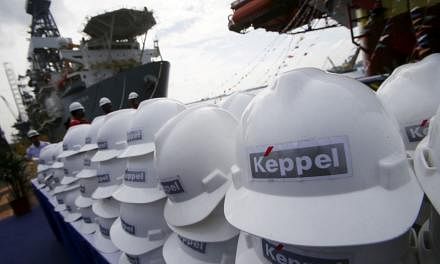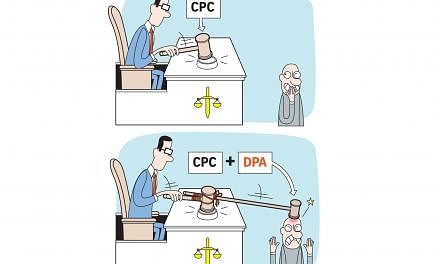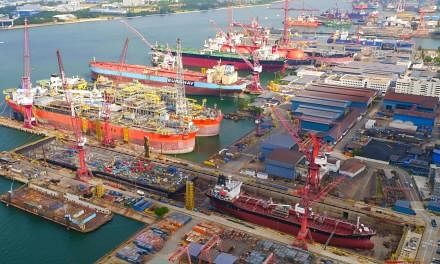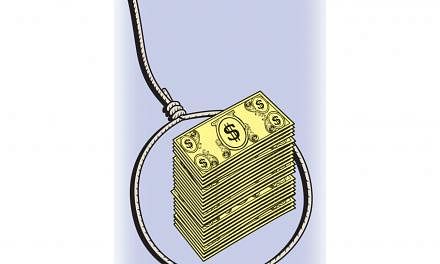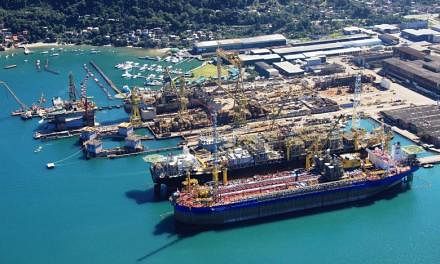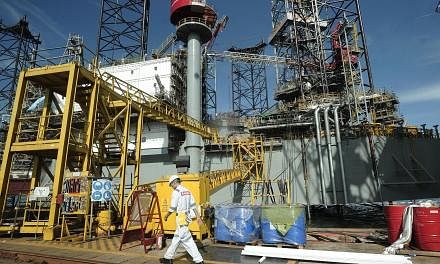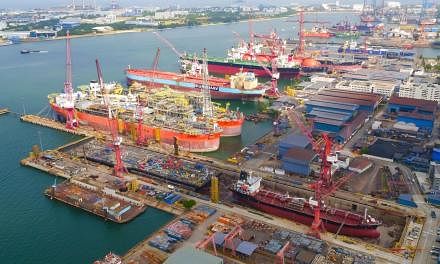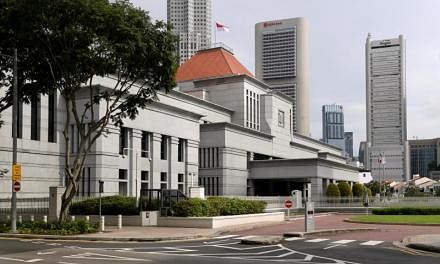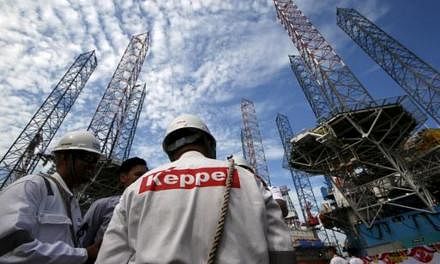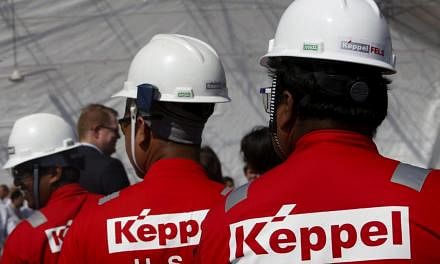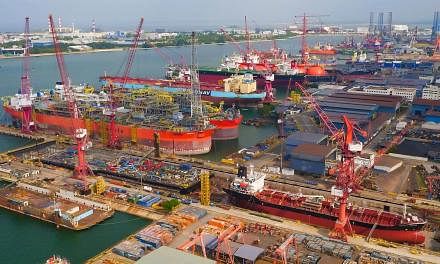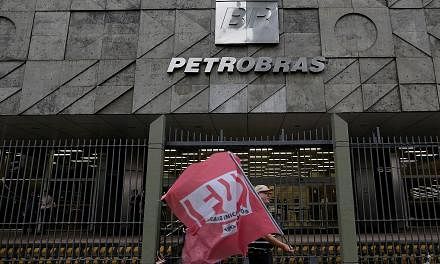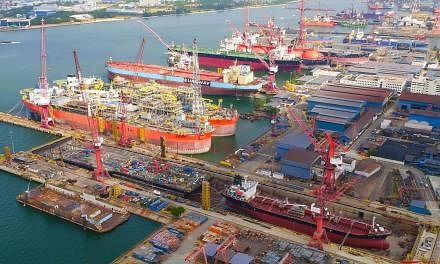SINGAPORE - The House on Monday (Jan 8) spent about 45 minutes discussing the corruption scandal involving Keppel Offshore & Marine (KOM).
After Senior Minister of State for Law Indranee Rajah answered parliamentary questions filed by MPs, a slew of supplementary questions were asked.
KOM, a unit of government-linked conglomerate Keppel Corporation, had reached an unprecedented global resolution with the authorities in the United States, Brazil and Singapore over corrupt payments totalling US$55 million (S$73 million) made by a former Keppel agent in Brazil.
Under this resolution, KOM has to pay US$422 million in fines.
Below is an edited transcript of the exchanges between Ms Indranee and various MPs.
Sylvia Lim (Aljunied GRC): Looking at what's been happening to Keppel as a government-linked company (GLC) and given the large sums of money involved and the damage to our reputation, people perceive that Keppel is just being given a slap on the wrist. Whereas it's a daily affair that individuals who are not well-connected are prosecuted for graft offences involving $10 or $20 and they go to jail. So I'd like the Government to respond to that because I think there is some public concern about what is perceived to be some lenient treatment being given to Keppel Offshore & Marine (KOM).
Indranee Rajah: Ms Lim suggested that people may be getting off lightly because it's a conditional warning. Now for this I think it's important to understand that there are actually two different things. First, there's the company, second there's the individual.
Insofar as the company is concerned it is not a light thing at all. They have not got off lightly. They paid something to the tune of US$55 million worth of bribes. They have been slapped with a penalty of US$422 million, that's something like eight times whatever that they paid out. They have been subject to an enhanced compliance regime under the the deferred prosecution agreement (DPA).
As I've pointed out we've actually achieved more than what we would have been able to do if they were prosecuted solely under the Prevention of Corruption Act in Singapore. And the company itself has obviously taken remedial actions. So as far as the company is concerned, make no mistake, there has been a heavy price to pay and deservedly so.
With respect to the individuals, investigations are still ongoing. That outcome has not been determined. Nobody has got off or not got off. That is something that the Public Prosecutor has to decide and I have explained some of the challenges that the Public Prosecutor is facing in terms of getting the evidence but that is something we have to let the Public Prosecutor deal with independently.
But let me just say one other thing on this, which is that it is not a matter of letting individuals off lightly. We have in the past taken actions against people irrespective of their status. We had in the ST Marine (STM) case that I mentioned all seven individuals were senior management including former presidents of STM, there was Patrick Lee, he was a former group financial controller of STM; there was Ong Teck Liang, former group financial controller; Han Yew Kwang, former CEO; Mok Kim Wang, former senior vice-president of STM; Tan Mong Seng, former president (commercial business) STM; Chan Chong Teck, former president STM; See Long Teck, former president STM.
Government officials and politicians have been investigated in the past by the Corrupt Practices Investigation Bureau (CPIB) and charged. This include a Minister of State Lee Toon Boon, sitting and former MPs Peh Yew Kok, Choo Wee Kiang, Singapore Civil Defence Force commissioner Peter Lim and National Kidney Foundation CEO T. T. Durai and the deputy chief executive of PUB Choy Hong Tin. There was a Cabinet minister Teh Cheang Wan who took his own life after CPIB started to investigate him. So there's no doubt about CPIB's record and there's no doubt that we will take action if there is cause to do so.
Tan Wu Meng (Jurong GRC): Even if the Government or Temasek Holdings do not manage the day-to-day operations of GLCs, what measures are there to send a clear signal that Singaporeans and Singapore companies outside must not engage in corrupt behaviour whether directly or through proxy agents? Does the Government have a view on whether KOM should conduct a clawback of bonuses paid out to ex-employees implicated in illegal behaviour and even if KOM has no legal means for clawback, should such bonuses be subject to forfeit by law under the Penal Code or the Prevention of Corruption Act if not so already?
Indranee Rajah: I certainly agree that it does hurt our reputation and for that reason we do not condone this, we are extremely disappointed as well in what has occurred. The Government expects Singapore companies and Singaporeans to do business honestly and lawfully even in complex environments and for Temasek, their position is that they foster an ethos of integrity and good governance and sustainability and they too do not condone improper conduct and malfeasance.
So Temasek expects companies in its portfolio to abide by sound corporate governance and robust codes of conduct and ethics. Temasek holds the respective boards and management responsible and accountable for the day-to-day decisions and actions of these portfolio companies but Temasek does not direct the day-to-day business decisions or operations of the Temasek portfolio of companies.
The second question the member asked was about whether we have a view on whether KOM should claw back bonuses paid out to ex-employees, et cetera. The Government does not intervene in internal corporate disciplinary actions. This is a matter for KOM and its board but as stated in the US DPA. KOM has imposed about US$8.9 million in financial sanctions on 12 former or current employees as part of the disciplinary process.
Pritam Singh (Aljunied GRC): In view of the Government's status as the largest single shareholder of Keppel, will Temasek Holdings call for an extraordinary general meeting with a view to pursue civil action against board members and senior executives found responsible for the bribery scheme for breach of fiduciary duties and to seek equitable compensation from those responsible.
A former Keppel CEO and senior adviser, Mr Choo Chiau Beng, was the Singapore ambassador to Brazil from 2004 till 2016 I believe. Was Mr Choo removed as ambassador because of his involvement or knowledge of the bribery scheme? And if so, and I stress if so, which month or year did the Government first come to know of Mr Choo's involvement? Finally, is the CPIB or the public prosecutor investigating whether Mr Choo used his position as ambassador to dishonestly assist Keppel secure contracts corruptly in Brazil?
My final question pertains to the matter of the identities of the individuals identified in the deferred prosecution agreement. There is a dissonance between what the public reads in the newspapers for individuals who are being investigated, for example, the general manager of Ang Mo Kio town council. No charges have been preferred against him yet but his identity, his name is well-known to the public. How does the minister reconcile that with the non-disclosure of the names of the individuals involved in the Keppel matter?
Indranee Rajah: Let me just deal with the last question first. The Government's position is very simple. The Government deals with the Government's actions. So the Government's actions are: When investigations are ongoing, we don't disclose identities of people being investigated. What other people may say outside, what other information may be floating outside, what other comments may go on in social media, that is separate. But as a government, as an investigation authority, the Government does not disclose names of individuals who are being investigated. And we are not alone in that. All civilised jurisdictions who have rule of law uphold that principle simply because you don't want to prejudice either the investigations or the persons being investigated depending on how the investigation might turn out.
With respect to the first question, I think Mr Singh asked can the Government as a shareholder call a meeting and I think ask for a resolution to be passed to commence civil action. I think that was the thrust of the question.
Let me just correct a few factual inaccuracies here. First, the Government owns 100 per cent of Temasek. the Government is not a direct shareholder of Keppel. Temasek owns just over 20 per cent of Keppel Corporation, which is not the entity in question here, which means there's 80 per cent of other shareholders. Keppel Corporation then owns 100 per cent of KOM, which is the entity in question here.
So the general principle of corporate governance with which Mr Singh is familiar as a lawyer is that the shareholders deal with their companies which they have shares at the shareholder level. Shareholders appoint the boards. The boards then, depending on whether the members are executive, non-executive, make sure that the policies, et cetera, for the company are proper, the governance is proper, and then the day-to-day operations are done by the executive, the executive team or the executive management.
Mr Singh also asked about the circumstances in which Mr Choo Chiau Beng has stepped down as ambassador. I do not have that information. What I can say is that he has stepped down and he is not involved in an ambassadorial role at the present time.
Lee Bee Wah (Nee Soon GRC): I'd like to ask who will pay the US$422 million if KOM is unable to pay? Will it be paid from our government budget?
Indranee Rajah: The monies will have to paid by Keppel. It would not come out of the Singapore budget. There would be no impact on the Government's fiscal position. Temasek's 20 per cent stake in Keppel is just one part of its portfolio. The Government's spending limit in relation to its reserves held by the Monetary Authority of Singapore, GIC and Temasek depends on the long-term expected returns on those assets. It's not based on actual cash contributions of the entities to the Government.
Png Eng Huat (Hougang): The minister mentioned that whether any KOM staff would be prosecuted depends on whether they benefited from the scandal. Would the minister clarify whether bonuses and salary increase given to senior staff, past and present, for meeting profit and revenue are deemed as personal benefits.
Would the minister not agree that the money earned by KOM through illegal and corrupt means are deemed improper? And then would the minister not agree that the dividends paid out by KOM, who knew very well its earnings were derived from bribing people and the political party in power, would also be deemed illegal and would then be need to be clawed back from members of senior staff, board of directors past and present? And the only way to ascertain the amount is through forensic audit. Would the Government be ordering one?
Indranee Rajah: Mr Deputy Speaker, the member has said that I had mentioned that whether or not there's action taken will depend on whether the individuals have benefited. Let me just go back to my original answer which I hope will be clear, I said how the Public Prosecutor decides will depend on several factors, so not just one factor. It includes the culpability of each individual, the available evidence, what is appropriate in the circumstances and the knowledge of each individual, the extent of his involvement, his motivations, any personal benefit he obtained, the circumstances under which relevant act took place and any cooperation rendered, so it's not a single factor, it's a whole array of factors which the Public Prosecutor will have to take into account.
